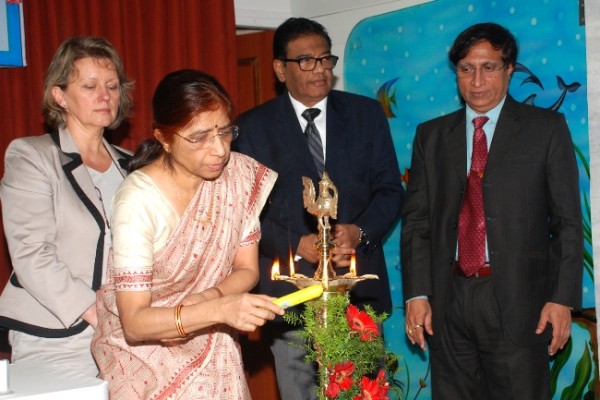International Symposium on “Halogenated Persistent Organic Pollutants” organized on January 16 at NEERI Auditorium.
Nagpur Today.
The chemicals Persistent Organic Pollutants (POPs) are toxic, persistent in the environment, and liable to bio-accumulate. These chemicals are among the most dangerous and highly toxic pollutants released into the environment, said Dr. Gode, Vice-Chancellor, Datta Meghe Institute of Medical Sciences at an International Symposium on “Halogenated Persistent Organic Pollutants” on January 16 at NEERI Auditorium. He further added that the diseases caused due to POPs such as cancer, allergies and hypersensitivity, damage the central and peripheral nervous systems, reproductive disorders, and disruption of the immune system. Some POPs also have carcinogenic effects, said Dr Gode.
Dr. Gode expressed concern over rapid transmission of POPs from one place to another as POPs can travel great distances around the globe through the atmosphere. He urged the scientists to find out solutions for restricting such POP transmission to avoid further impacts on environment and health. The alarming aspect is that some recent studies have indicated recurrence of cancer in many patients due to POPs, and the number of breast cancer patients are continuously increasing. Dr. Gode expressed his willingness to work with NEERI to find out solutions to the growing problems of POPs. He assured the scientists that health problems occurring due to POPs can only be minimized through interdisciplinary research and his Institute is looking forward to such collaboration.
Dr. Katarina Magulova, UNEP Geneva , while speaking at the conference talked about the importance of Stockholm Convention programmes that helped in reducing POPs from the environment. She informed that decreasing trends of POPs in some countries are a result of mitigation measures adopted through Stockholm Convention.
Earlier, in his welcome address, Dr. Satish R. Wate, Director, CSIR-NEERI, informed that CSIR-NEERI as “Stockholm Convention Regional Centre for Asia on POPs” has taken up many initiatives to minimize and manage POPs for environment and health protection. NEERI has created facilities for analysis of POPs, he added. “But still challenge lies in understanding persistency and life cycle assessment of POPs,” he said. He stated that we need to strictly follow the quality assurance and quality control procedures with regard to POPs.
Dr. (Mrs.) Neeta Thacker, Chief Scientist & Convener briefed about the symposium and Dr. G.L. Bodhe, Head, AID, proposed the vote of thanks.
During the day, three sessions were organized in which various national and international experts presented various aspects as regards pesticides in the environment, food and feed; status of pesticide residues in agricultural produce and water — scenario in India; sources of POPs and emission inventories; and emerging and naturally occurring compounds in the environment. They presented some novel findings and technological breakthroughs in these areas. Poster session was also organized on the theme of the symposium , which was inaugurated by Dr. Sukumar Devotta, former Director, NEERI and Prof. ESR Gopal, former Director, National Physical Laboratory, New Delhi.













